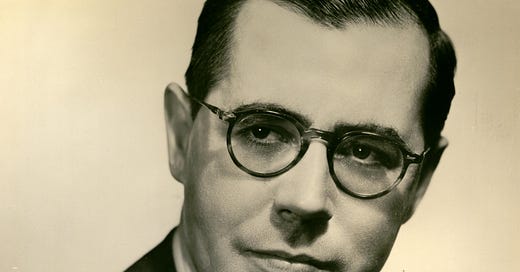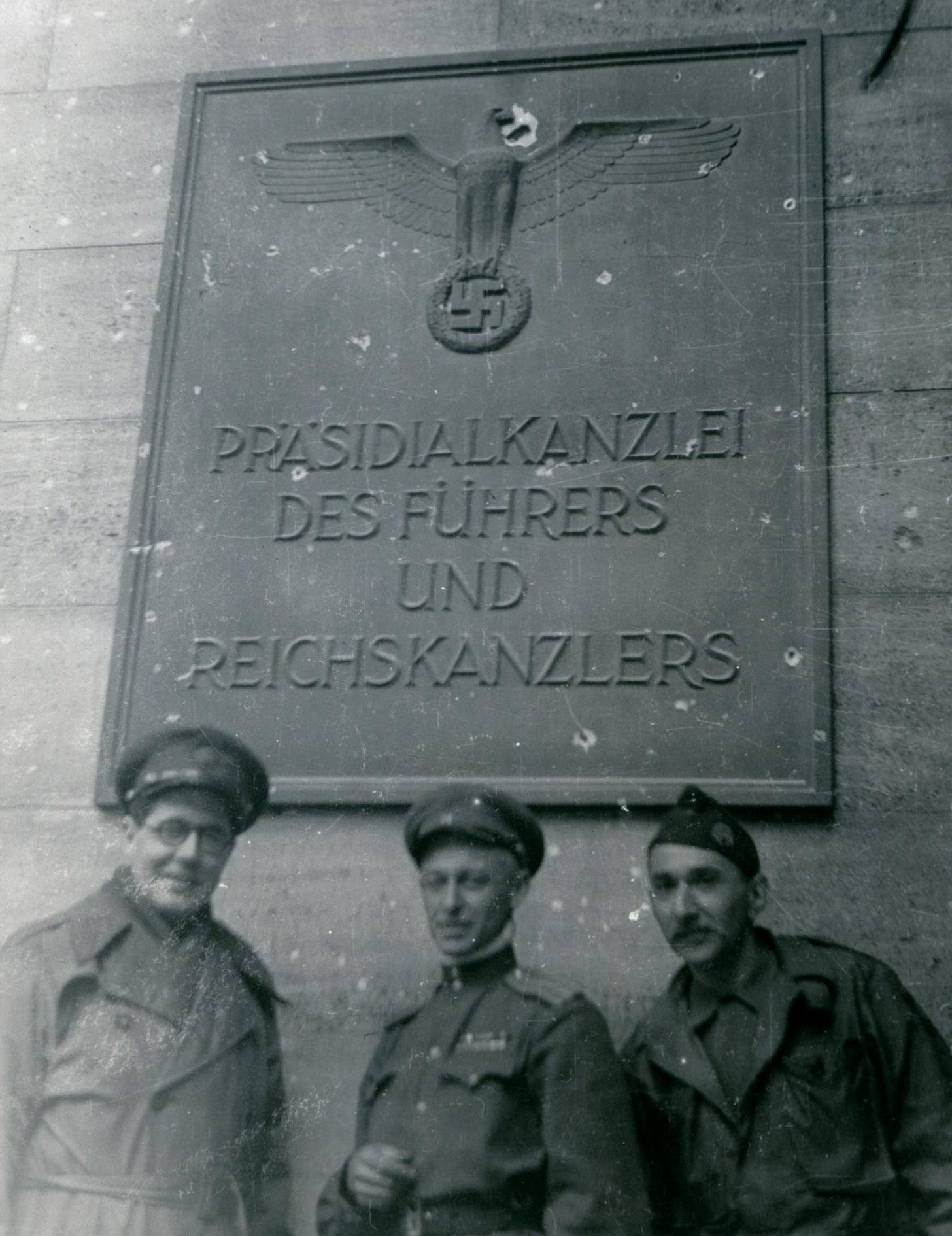John MacVane's five years of war in Europe
When considering American broadcast journalism in World War II, the CBS news operation headed by Edward R. Murrow inevitably springs to mind first, but John MacVane was right there with them from the beginning of the war in Europe to the end.
Born April 29, 1912 in Portland, Maine, MacVane first traveled to Europe as a young man, earning a graduate degree from Oxford in 1935 after doing his undergraduate work at Williams College. MacVane began his journalism career in newspapers, covering politics from the Brooklyn Eagle and also doing a stint at the New York Sun, before heading out on what was intended to be a summer vacation to Europe in 1938 with his wife Lucy.
With conflict seemingly imminent, they decided to stay, setting up shop in London. MacVane found work as a sub-editor (copy editor in U.S. lingo) for the Daily Express before heading to Paris to work first for the Daily Mail and later a pair of wire services: Exchange Telegraph and the International News Service.
They fled Paris on June 10, 1940 along with the rest of the INS staff in the capital and made their way to the coast, where they sailed for England on June 19. MacVane intended to return home from London and join the Army ahead of the inevitable fight to come — he and Lucy already had purchased tickets for the Atlantic crossing — but NBC’s Fred Bate offered him the chance to stay and cover the expected battle for Britain.
His first full broadcast came on July 4, 1940, when he reported on Prime Minister Winston Churchill’s announcement to the House of Commons that the Royal Navy had sunk most of the French fleet at Mers-el-Kébir. But the dominant theme of his newscasts — and indeed all of life in London — soon became the German air raids that hammered the city night after night. MacVane endured dozens of them and joined other correspondents in reporting from fiery, rubble-strewn impact sites.
By 1942, the Allies were ready to take the war to the enemy, and MacVane was there from the beginning. He accompanied the Canadian raid on Dieppe that August, and the report he produced after returning to London drew praise from even his longtime CBS rival, Larry LeSueur, who cabled him from Moscow after hearing it there: “WONDERFUL BROADCAST.”
MacVane landed in Algiers in November, and after some jockeying for position with Robert Dunnett of the BBC and Charles Collingwood of CBS managed to get the first full broadcast report out of North Africa. He also was first on the microphone that Christmas Eve to report that Adm. François Darlan had been assassinated in Algiers.
His next big assignment was the biggest of all: D-Day. Due to MacVane’s experience and seniority, his boss, Stanley Richardson, had told MacVane he could have his pick of assignments when the long-awaited invasion finally came.
“I said, ‘Stan, since I was kicked out of France by the Germans, there is just one thing I have wanted to do — go back to France with the first combat troops to hit the beach,’” MacVane wrote in his memoir, On the Air in World War II.
Specifically, MacVane wanted to accompany the 1st Infantry Division, and he got his wish, joining Jack Thompson of the Chicago Tribune and Don Whitehead of the Associated Press with the Big Red One.
MacVane sailed for Normandy aboard the Samuel Chase, bunking with Whitehead in the ship’s hospital ward. An officer asked the broadcaster to read Eisenhower’s famous “great crusade” order of the day over the ship’s loudspeaker system.
MacVane went ashore at Omaha Beach around 10:30 a.m., some two hours later than he had been scheduled to land. He had been seasick on the rough ride in, and described his initial slog ashore in his book:
I was one of the first off the landing craft. The coldness of the water was a shock, but by that time I felt numb all over and dead tired. I weaved and staggered as I moved through the water, and I felt that if I fell, I might never get up. The typewriter and my entrenching tool felt as heavy as though they were made of lead, and the water had soaked into my uniform so that it seemed to drag me down.
I had a fleeting thought of the men who had to go in with rifles, Brownings, mortars and ammunition, and grenades. What must they have struggled against?
He was just east of the Les Moulins Draw, but was not in the proper state of mind for reporting: “I did not pay much attention to what went on around me for the first hour or so.” He focused on digging a foxhole, and only when that was complete did he settle down and attempt to assess the situation.
The battle raged around him, finally waning a bit in late afternoon. At that point, he reunited on the beach with Thompson, Whitehead and John “Tex” O’Reilly of the New York Herald Tribune, who had been attached to the division artillery. The four correspondents would spend the night sleeping in a trench, thankful to be alive but frustrated that the communications plan had broken down, leaving them unable to transmit stories from the beachhead.
While the print correspondents eventually were able to get word back to London and on to the rest of the world, MacVane’s efforts were frustrated by bureaucracy. Though he was able to track down a working radio on June 8 and transmit a broadcast that had been cleared by censors, officials in London refused to allow it on the air because the pre-approved plan — which MacVane knew nothing about — didn’t call for broadcast reports to be transmitted from Normandy until some three weeks after the landings.
“The broadcast went to London perfectly,” MacVane lamented, “but nobody outside the BBC and the Army Signal Corps ever heard it.”
MacVane’s reporting from the beachhead effectively ended later that day. Making his way through the countryside, he leapt across a hedgerow ditch and landed awkwardly. Medical personnel told him he likely had broken his ankle, but they couldn’t be sure because they couldn’t take X-rays. On Monday, June 12, he flew back to England aboard a transport plane, his leg in a cast. Before heading to the hospital for more thorough examination, he did a 15-minute broadcast on the invasion for NBC.
MacVane returned to France near the end of July and joined the First Army press camp at the Chateau de Vouilly. A month later, he rolled into Paris with other correspondents, a joyous reunion with the city he had fled four years earlier.
He would set up shop at the press headquarters there, the Hotel Scribe, for the next several months before setting off across Germany to cover the collapse of the Third Reich. He reported from the long-awaited meeting between the American and Russian armies at the Elbe in late April 1945
From there, MacVane and three other correspondents decided to make a run for Berlin. They got to the very center of the city and ended up accompanying Red Army troops in the surrounding area for several days.
After the German surrender, MacVane got on the phone with a First Army public relations officer, who advised him to keep his exploits quiet. Two other correspondents who also had struck out on their own for the German capital — Virginia Irwin and Andrew Tully — had seen their credentials revoked as punishment. Duly warned, MacVane and the others never mentioned Berlin in their subsequent reports.
Following the war, MacVane would cover the United Nations for NBC, then spend time working for the United States mission to the UN before returning to broadcasting at ABC. He retired in 1977 and moved back home to Maine five years later.
MacVane died of a heart attack in 1984 at age 71.





